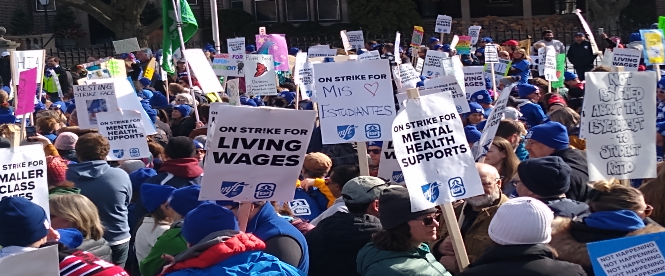Our problems are not unique to Minneapolis or Saint Paul. We are watching our public schools everywhere become privatized. We are watching corporate greed take over and watching people call our kids ‘market share.’ This is a movement that has been happening and will continue to happen across the country as long as human beings are educating human beings.
Greta Callahan, president of the Minneapolis Federation of Teachers
Over the last week, multiple rallies and demonstrations across Minneapolis attracted thousands of teachers, families and community members in support of striking teachers. On March 17, nearly 20 blocks of Lake Street were filled with union supporters lining the sidewalk. For hours, teachers talked to the community about their struggles, trucks drove up and down the length of the line leading call and response chants, and impromptu dances and a school band played pep rally songs outside the Adult Education building.
On March 18, an even larger demonstration took place outside the governor’s manor, though Governor Tim Walz made the decision to meet with business interests in Minneapolis rather than with striking educators picketing outside his home. This is the first strike by the Minneapolis Federation of Teachers in more than 50 years, but that hasn’t stopped educators and the community from showing up.
The conditions which led to the strike have been building for a long time. Minneapolis teachers make far less than educators in surrounding districts — around $17,000 per year less than in neighboring Saint Paul — and Education Support Professionals start at only $24,000 per year. These lower-paid workers have been central in the latest contract negotiations; the union is fighting to raise their minimum starting pay to $35,000 per year and lower their healthcare premium costs below those of school administrators. Fighting to both hire and retain educators of color and ensure they have a voice in their workplace is another core issue for the union. Other demands, such as putting in place a maximum classroom class size of 30 students per teacher, guaranteeing there is a social worker and counselor at every school every day, and requiring that a comprehensive plan with educator feedback is developed for distance learning, are also sticking points with the school board.
The core issue the school board is claiming is one of funding. Minneapolis public schools have had declining enrollment rates since 2017, and as of now, only 58% of eligible students in Minneapolis attend public schools, with charter and especially private schools taking the lion’s share of departing students. In the last decade, there have been three major attempts by the state legislature to introduce private school voucher programs or other funding for privatizing education, but so far they have all been defeated before becoming policy. Privatization of public services — which inevitably serves only to enrich private interests by stealing the public monies from working-class communities — is all too common in the United States.

This year, Minnesota’s estimated state budget has a surplus of more than $9.3 billion. The total cost for meeting the union’s demands is estimated to be below $23 million — less than a quarter of one percent of the surplus. Within Minneapolis itself, claims of insufficient funding ring hollow as well. The city has increased its police budget to over $191 million, an increase of more than $27 million from the last year. Mayor Frey has claimed this budget increase is needed in order to swell the ranks of the police, citing the mass resignations and retirements that occurred during the 2020 George Floyd uprisings and resultant calls to disband or defund the MPD. The city council, rhetorically once firmly on the side of the people, has offered no meaningful pushback to this increase in police funding.
Adam, an ESP taking part in the strike, told Liberation News that he doesn’t believe that funding is the issue: “This isn’t about the money. This is about the school board wanting to send a message to us to fall in line and stop asking for stuff. They have the money, they know they could, they just don’t want to do it.”
Sam, a school secretary, agreed, “Even on stuff that doesn’t cost them anything, they won’t listen to us.”
The community is rallying behind the strike. Thousands are turning out every day to support the union at different schools and planned events. Donations of both time and money have flowed in, and the union has raised more than half a million dollars for its strike fund so far.
Other unions, including the Saint Paul Federation of Educators, which represents teachers, educational assistants and school/community service professionals, and the Service Employees International Union 284, which represents food service workers in the district, have both continued to take part in actions alongside MFT Local 59, despite securing contracts themselves over the last few weeks. Both unions had overwhelmingly passed strike votes this month, and their respective contracts were secured literally hours before planned strikes.
Details on the SEIU 284 contract have yet to be made public, but the SFE sought many of the same goals MFT 59 is fighting for including classroom size caps, increased mental health support staff, one-time recognition payments, and increased compensation especially for ESPs and other support staff. Students have lent their time and energy toward the strike as well, demonstrating alongside teachers, speaking out directly to the school board, and helping raise money for the strike fund. Earlier this year, student groups were responsible for multiple mass walkouts in support of educators, and these same groups have continued to take part in direct action alongside MFT 59 throughout the strike.
There are clear cracks showing from the school board as well. Last week, school board member Josh Pauley resigned, saying that, “Trust is broken and needs to be rebuilt.” Maggie Sullivan, the senior head of human resources and one of the active negotiators for the school board, has also resigned, though she has indicated she will remain on the negotiating team until the end of the strike.
On March 21, the district put forward its “last, best, and final offer,” which still stops short of the workers’ demands for a minimum of the $35,000 per year for ESPs, fails to provide sufficient mental health support for students and staff, does not include language to protect educators of color from layoffs and many other issues. MFT Local 59 has rejected that offer and the strike continues.
You can support the strike fund here.






